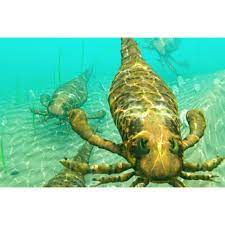New Delhi. It is said that many secrets are buried in the depths of the sea. Sometimes strange things are found from the sea which surprises everyone. Some researchers have found the remains of one such scorpion from the sea in China, which they were shocked to see. Because these are not the remains of any common scorpion but of a special species whose size was thousand times larger than common scorpions when found on earth.
According to the information, archaeologists have found the remains of these scorpions in the depths of the sea, after seeing which the researchers were also surprised. These remains are 3.3 feet large, which is evidence that there used to be very large scorpions earlier under water and probably also on earth. According to the explorers, these remains are about 430 million or 43 million years old. Researchers have named this particular species as T. jiushanensis.
These special species of scorpions used to be like crabs of today’s era. He had created panic because of his huge size. Experts believe that this creature living in water must have come out of the sea to the earth in search of food. The scorpion of this particular species can be considered to be of the present-day scorpion and crab family. This shocking discovery has been published in the journal Science Bulletin.
The shape of these giant scorpions was found printed on the rocks buried in the depths of the sea. Bo Wang, the author of Stugi, says that these sea scorpions are called eurypterids in the language of science. They used to attract females with their prickly moustache. These could be as big as humans in size.
Bo Wang told that the size of the remains he found is as big as a dog. This is the biggest discovery made in Asia in the last 80 years. Earlier dogs were found in the ancient supercontinent Gondwana. The study claimed that such scorpions used to be in different places in the world. There were a total of 4 species of them, whose search is going on. This species of scorpions ruled the sea for centuries.
 Indian Thought Latest News & Views
Indian Thought Latest News & Views



